Link May Want to Save the Day, But Do You?
Posted on March 19 2016 by Jon Lett
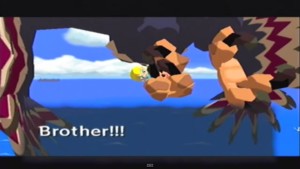 At any one point during your adventure throughout Hyrule, would you say that you actively think back to what you are fighting for? Sure, you may be busy thinking about solving a puzzle or fighting some monsters, but in the back of your mind, you should be able to recall just what all the adventuring is for. You should be able to, because a good adventure game should make you feel like it’s all worth it. Zelda is no exception, but sometimes, I believe that there could be a bit more… motivation. Not for Link. He seems ready to go at any point. I mean for the player. You should see a giant boss, and think, “this is scary, but I’ll beat it for…” something/someone. Right? Some Zelda titles have certainly presented some major purpose behind Link’s journey, but others… well, perhaps there is room for improvement in the motivation department.
At any one point during your adventure throughout Hyrule, would you say that you actively think back to what you are fighting for? Sure, you may be busy thinking about solving a puzzle or fighting some monsters, but in the back of your mind, you should be able to recall just what all the adventuring is for. You should be able to, because a good adventure game should make you feel like it’s all worth it. Zelda is no exception, but sometimes, I believe that there could be a bit more… motivation. Not for Link. He seems ready to go at any point. I mean for the player. You should see a giant boss, and think, “this is scary, but I’ll beat it for…” something/someone. Right? Some Zelda titles have certainly presented some major purpose behind Link’s journey, but others… well, perhaps there is room for improvement in the motivation department.
Hit the jump for some examination of the series’ various reasons players are given to fight, whether they feel truly worth it, and what could be used in the future as better player incentive.
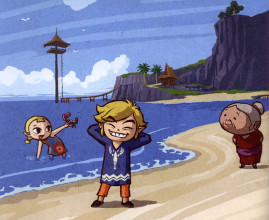 When you start up almost any Zelda title, you are given at least some context to the living situation of your avatar, Link. Whether he is heading to a festival with his childhood friend, the princess, living an everyday life with his fellow villagers, being called forth by an imprisoned Zelda, or setting out to help a pirate that fell to his island home, there has to be some basic context as to who your character is, and something to get the game going. This is a good opportunity to develop some characters, and to grow even mildly attached to certain people and places, before something bad comes along and takes it all away. After all, “saving the world” is all well and good, but a little generic. Modern Zelda’s have become accustom to giving Link a close childhood friend or two, and after some opportunities to show their closeness, having them be kidnapped/turned to stone/left behind/imprisoned, initiating the adventure. Whether you feel really motivated to go out and fiix thinga, though, depends on your short time spent around them (Or an agonizingly long time. Thanks Skyward Sword.). Later, the major plot will step up, revealing the main villain, the fate of the world, and your primary mission, but that usually comes after some time trying to save whoever has been taken or hurt. One can only hope that that mission will feel worth it.
When you start up almost any Zelda title, you are given at least some context to the living situation of your avatar, Link. Whether he is heading to a festival with his childhood friend, the princess, living an everyday life with his fellow villagers, being called forth by an imprisoned Zelda, or setting out to help a pirate that fell to his island home, there has to be some basic context as to who your character is, and something to get the game going. This is a good opportunity to develop some characters, and to grow even mildly attached to certain people and places, before something bad comes along and takes it all away. After all, “saving the world” is all well and good, but a little generic. Modern Zelda’s have become accustom to giving Link a close childhood friend or two, and after some opportunities to show their closeness, having them be kidnapped/turned to stone/left behind/imprisoned, initiating the adventure. Whether you feel really motivated to go out and fiix thinga, though, depends on your short time spent around them (Or an agonizingly long time. Thanks Skyward Sword.). Later, the major plot will step up, revealing the main villain, the fate of the world, and your primary mission, but that usually comes after some time trying to save whoever has been taken or hurt. One can only hope that that mission will feel worth it.
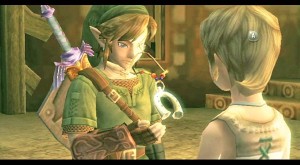 Some factors can help with motivating you to care about this person. They could be a new iteration of a familiar character, like Skyward Sword‘s Zelda; they could be a family member, like The Wind Waker‘s Aryll; they could be a high figure that is kind to you while others are not, like Spirit Tracks’ Zelda. What matters after all of that, though, is making that heroic ambition last. Not hearing from or about that person in danger would diminish the original intent a bit. Thankfully, some more recent titles helped that issue a lot. Twilight Princess in particular made a point to selectively and repeatedly return to the issue of the Ordon children and Ilia. Even after hearing the details of Hyrule’s strife from Zelda, Link stays true to his mission for the Ordonians. He helps the kids out of the twilight, then later from King Bulblin, and even later helps out Ilia with transportation to Kakariko, and then with returning her memory. All along your journey, whether for the sake of their safety, or just to remember where Link comes from and where his heart lies, you are reminded of where it all started, and the finer points of the overall story are preserved. Even Midna has repeated instances of asking you for help and learning from her experiences with Link, making you want to help her fix things more and more. I believe such recurring sights of beloved characters should continue in new games, to keep the player with a level of perspective when it comes to feeling like you are fighting a worthy fight. Now all that being said, this only covers the initial motivations in many of the games. There is plenty to come later.
Some factors can help with motivating you to care about this person. They could be a new iteration of a familiar character, like Skyward Sword‘s Zelda; they could be a family member, like The Wind Waker‘s Aryll; they could be a high figure that is kind to you while others are not, like Spirit Tracks’ Zelda. What matters after all of that, though, is making that heroic ambition last. Not hearing from or about that person in danger would diminish the original intent a bit. Thankfully, some more recent titles helped that issue a lot. Twilight Princess in particular made a point to selectively and repeatedly return to the issue of the Ordon children and Ilia. Even after hearing the details of Hyrule’s strife from Zelda, Link stays true to his mission for the Ordonians. He helps the kids out of the twilight, then later from King Bulblin, and even later helps out Ilia with transportation to Kakariko, and then with returning her memory. All along your journey, whether for the sake of their safety, or just to remember where Link comes from and where his heart lies, you are reminded of where it all started, and the finer points of the overall story are preserved. Even Midna has repeated instances of asking you for help and learning from her experiences with Link, making you want to help her fix things more and more. I believe such recurring sights of beloved characters should continue in new games, to keep the player with a level of perspective when it comes to feeling like you are fighting a worthy fight. Now all that being said, this only covers the initial motivations in many of the games. There is plenty to come later.
 After initially leaving to save someone or help someone Link knows, the meat of the game begins. There is certainly enough variety in terms of plot for you to feel like you are never repeating a game’s plot. At least, not blatantly repeating it. There is always some crazy happening that throws the world off balance. Depending on who you ask, any number of the evil schemes in the series could be seen as more impending and diabolical. Who do you feel is the bigger threat: The resurrected dessert king, or the mighty Wind Mage? What is a bigger motivator to hurry up and save the day: Zelda and Hyrule Castle encased in a twilight cage, or a world-destroying Moon slowly falling towards you? It is all about how you look at the situation, and of course, who the perpetrator is. Personally, I think that the more important aspect of the plot is not what is actually happening, but rather how your view of it is molded by the game itself. For example, sure, the whole world being covered in twilight may seem more important than Tetra being taken by a Ghost Ship, but were Phantom Hourglass to have executed its plot in a truly effective way, it could have matched the scale and intensity of Twilight Princess‘ story, while keeping the same plot. It’s all about execution, really. How you portray the incoming danger, and how you are made to think or feel.
After initially leaving to save someone or help someone Link knows, the meat of the game begins. There is certainly enough variety in terms of plot for you to feel like you are never repeating a game’s plot. At least, not blatantly repeating it. There is always some crazy happening that throws the world off balance. Depending on who you ask, any number of the evil schemes in the series could be seen as more impending and diabolical. Who do you feel is the bigger threat: The resurrected dessert king, or the mighty Wind Mage? What is a bigger motivator to hurry up and save the day: Zelda and Hyrule Castle encased in a twilight cage, or a world-destroying Moon slowly falling towards you? It is all about how you look at the situation, and of course, who the perpetrator is. Personally, I think that the more important aspect of the plot is not what is actually happening, but rather how your view of it is molded by the game itself. For example, sure, the whole world being covered in twilight may seem more important than Tetra being taken by a Ghost Ship, but were Phantom Hourglass to have executed its plot in a truly effective way, it could have matched the scale and intensity of Twilight Princess‘ story, while keeping the same plot. It’s all about execution, really. How you portray the incoming danger, and how you are made to think or feel.
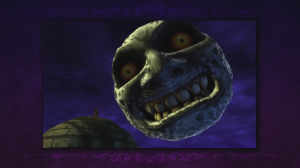 There are some extremely effective methods of pushing the player forward like this. In my eyes, the most important is consistency. Knowing the threat is all well and good, but having a constant method of reminding you of its presence is even better. One great example is Majora’s Mask‘s overall idea of the apocalypse. The player, and Link, are the only ones that know exactly what is going on behind the scenes, with Skull Kid, Majora’s Mask, and the Moon, as is the case with many series games. But the big difference here is that the lives of the NPC’s you speak to every day are being effected by the coming doomsday, which is a constant source of worry for everyone in Termina. The Moon is always falling, but even if you begin to forget about it being up there over time, getting caught up in the game itself, the characters are always dealing with the fact that there is not much time left. That is true motivation: a constant worry for the world and people around you, and a wish to give them hope, something they are sadly lacking. Not only that, but the sheer scale of Majora’s Mask‘s threat, THE END OF THE WORLD, is bigger than the usual threat of a coming villain. It is not just the the country you are in that is in danger. Everyone in the world is at stake. Oh, and on a side note, the whole of Termina is filled with alternate versions of people Link met and helped in Ocarina of Time, giving you familiar faces to sympathize with; another great motivator.
There are some extremely effective methods of pushing the player forward like this. In my eyes, the most important is consistency. Knowing the threat is all well and good, but having a constant method of reminding you of its presence is even better. One great example is Majora’s Mask‘s overall idea of the apocalypse. The player, and Link, are the only ones that know exactly what is going on behind the scenes, with Skull Kid, Majora’s Mask, and the Moon, as is the case with many series games. But the big difference here is that the lives of the NPC’s you speak to every day are being effected by the coming doomsday, which is a constant source of worry for everyone in Termina. The Moon is always falling, but even if you begin to forget about it being up there over time, getting caught up in the game itself, the characters are always dealing with the fact that there is not much time left. That is true motivation: a constant worry for the world and people around you, and a wish to give them hope, something they are sadly lacking. Not only that, but the sheer scale of Majora’s Mask‘s threat, THE END OF THE WORLD, is bigger than the usual threat of a coming villain. It is not just the the country you are in that is in danger. Everyone in the world is at stake. Oh, and on a side note, the whole of Termina is filled with alternate versions of people Link met and helped in Ocarina of Time, giving you familiar faces to sympathize with; another great motivator.
“Actually… I know… We’re not safe here, either… That’s how life goes, I guess. There are some things in life that you can’t change no matter how hard you try.” — Cremia
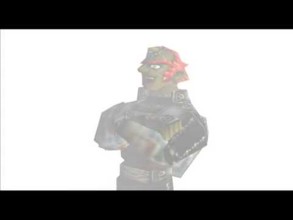 Another rather powerful method is giving the player a sense of recurring loss or failure. An almost stale aspect of the Zelda series is the recurring design of losing something important at the beginning, and then only gaining loads of items and knowledge throughout the game. Some occasional, or even frequent, loss across your whole adventure could really pay off, as it would put Link, and by extension the player, in a more desperate state of mind. Granted, a few games have attempted this somewhat. After making friends and helping people left and right in the first part of Ocarina of Time, Link finds out his actions caused Ganondorf to obtain the Triforce. For the rest of the game, you are forced to witness the suffering that the people of Hyrule went through for seven years after you essentially failed in your mission outright. After letting down Saria, Zelda, Malon, and even the Deku Tree, you ultimately feel a major obligation to fix things. The same feeling is expressed on a much lesser scale in The Wind Waker when you realized pulling the Master Sword unlocked Ganondorf’s power again. Personally, I believe this is something that should be explored much further. More recent games seem to like to give the player spontaneous moments where everything seems fine, and then the villain surprises you with “bad news”. Moments like this include Ghirahim taking Zelda after her recent rescue, Zant putting a force field around Hyrule Castle, and Bellum taking Tetra after turning her back from stone. I imagine these moments are meant to strike a nerve in the player, angering them after so much work to make things right, only to see it all be taken away. I can see the reasoning for this, but it is not the best way to get the player going, in my opinion. Irritation can only drive you so far.
Another rather powerful method is giving the player a sense of recurring loss or failure. An almost stale aspect of the Zelda series is the recurring design of losing something important at the beginning, and then only gaining loads of items and knowledge throughout the game. Some occasional, or even frequent, loss across your whole adventure could really pay off, as it would put Link, and by extension the player, in a more desperate state of mind. Granted, a few games have attempted this somewhat. After making friends and helping people left and right in the first part of Ocarina of Time, Link finds out his actions caused Ganondorf to obtain the Triforce. For the rest of the game, you are forced to witness the suffering that the people of Hyrule went through for seven years after you essentially failed in your mission outright. After letting down Saria, Zelda, Malon, and even the Deku Tree, you ultimately feel a major obligation to fix things. The same feeling is expressed on a much lesser scale in The Wind Waker when you realized pulling the Master Sword unlocked Ganondorf’s power again. Personally, I believe this is something that should be explored much further. More recent games seem to like to give the player spontaneous moments where everything seems fine, and then the villain surprises you with “bad news”. Moments like this include Ghirahim taking Zelda after her recent rescue, Zant putting a force field around Hyrule Castle, and Bellum taking Tetra after turning her back from stone. I imagine these moments are meant to strike a nerve in the player, angering them after so much work to make things right, only to see it all be taken away. I can see the reasoning for this, but it is not the best way to get the player going, in my opinion. Irritation can only drive you so far.
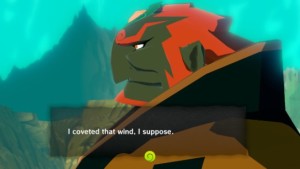 Of course, if you want to talk about danger in Zelda, you can’t forget the villains. No Zelda game can go without some villain to oppose Link. Nowadays, there seems to be a major need for most games to develop the main villain to some extent. After all, this ain’t 1986. We can’t step into an open world and expect an awesome fight with a final boss whom we only know the name of and nothing else. A little characterization at the least is important, even with someone like Ganondorf, who we have seen several times. His characterization basically peaks in The Wind Waker, but it is right at the end when he monologues a bit about his old home. Had someone not seen Ganondorf before, they may feel as though hew is a boring villain in that game, as it banks on familiarity from players. His recurrence hinders him as a character, in that sense. That is why he is not really a villain I would say I “love to hate” at this point.
Of course, if you want to talk about danger in Zelda, you can’t forget the villains. No Zelda game can go without some villain to oppose Link. Nowadays, there seems to be a major need for most games to develop the main villain to some extent. After all, this ain’t 1986. We can’t step into an open world and expect an awesome fight with a final boss whom we only know the name of and nothing else. A little characterization at the least is important, even with someone like Ganondorf, who we have seen several times. His characterization basically peaks in The Wind Waker, but it is right at the end when he monologues a bit about his old home. Had someone not seen Ganondorf before, they may feel as though hew is a boring villain in that game, as it banks on familiarity from players. His recurrence hinders him as a character, in that sense. That is why he is not really a villain I would say I “love to hate” at this point.
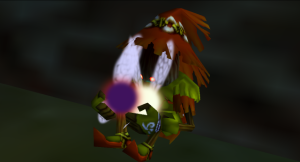 Newer/lesser-used characters, like Vaati, Zant, Ghirahim, and Skull Kid feel much more worth stopping. They are either given the kind of personality and backstory that makes me happy to beat them, or in Skull Kid’s case, you feel bad for him, and ultimately want to show him what he is doing is wrong. While living in a world worth saving is great, actively wanting to take on the bad guy themselves is just as important. The ending of a great game should not be underwhelming, so the final fight should feel truly worth it. Saying that, I would like to see some deviation from the current villain-related habits of the series. The age-old “single villain” concept could be changed, with multiple baddies, giving the player a range of targets to focus their anger, or other emotions, depending on said villains’ depictions. Another option is having a villain that you, or Link, may not entirely disagree with, or that is ambiguously “evil”. There is plenty to be said about fighting a figure of darkness, but there is also some major potential in the protagonist occasionally having doubts about their mission. Making the player really think deeply about what they are fighting for, and more so, the consequences, is very effective in driving that player forward. And of course, the “recurring sightings” thing I mentioned earlier about Twilight Princess‘ NPC’s even applies to villains. Seeing who you are fighting, and being shown more and more reasons for standing against the enemy will keep you going, ever motivated. Zant, Ghirahim, and even Ganondorf’s numerous appearances throughout their respective games kept us on our toes, and made them all the more memorable, so this is certainly a design technique to continue in the future.
Newer/lesser-used characters, like Vaati, Zant, Ghirahim, and Skull Kid feel much more worth stopping. They are either given the kind of personality and backstory that makes me happy to beat them, or in Skull Kid’s case, you feel bad for him, and ultimately want to show him what he is doing is wrong. While living in a world worth saving is great, actively wanting to take on the bad guy themselves is just as important. The ending of a great game should not be underwhelming, so the final fight should feel truly worth it. Saying that, I would like to see some deviation from the current villain-related habits of the series. The age-old “single villain” concept could be changed, with multiple baddies, giving the player a range of targets to focus their anger, or other emotions, depending on said villains’ depictions. Another option is having a villain that you, or Link, may not entirely disagree with, or that is ambiguously “evil”. There is plenty to be said about fighting a figure of darkness, but there is also some major potential in the protagonist occasionally having doubts about their mission. Making the player really think deeply about what they are fighting for, and more so, the consequences, is very effective in driving that player forward. And of course, the “recurring sightings” thing I mentioned earlier about Twilight Princess‘ NPC’s even applies to villains. Seeing who you are fighting, and being shown more and more reasons for standing against the enemy will keep you going, ever motivated. Zant, Ghirahim, and even Ganondorf’s numerous appearances throughout their respective games kept us on our toes, and made them all the more memorable, so this is certainly a design technique to continue in the future.
In the end, I feel as though Zelda has learned a lot from its own high and low points of fan response to each new game, but when it comes to keeping players motivated, there is no shortage of new things to try. Between the initial reason for Link’s journey, the overall stakes, the overarching plot, and the villain, there is plenty for the player to feel driven by, but if Nintendo wants to continue its innovative style of game design, this aspect of the Zelda series is something to work on for awhile. And one thing I think Nintendo should especially remember, for all the points of player motivation, is consistency.Don’t just present us with a great reason for fighting the good fight. Keep us thinking about it all the time. Never let us forget what is at stake, and I think that fans will appreciate it. We will always be ready to defend Hyrule, its people, and the heavenly power it holds, but Nintendo has a lot they could do to keep us motivated from start to finish, so I hope they keep that in mind as they continue working on Zelda Wii U.
What do you guys think of Zelda’s past methods of motivating the player to keep adventuring? Is there anything specific a new game could do to make you feel like fighting even harder to save the day? Drop a comment below!



